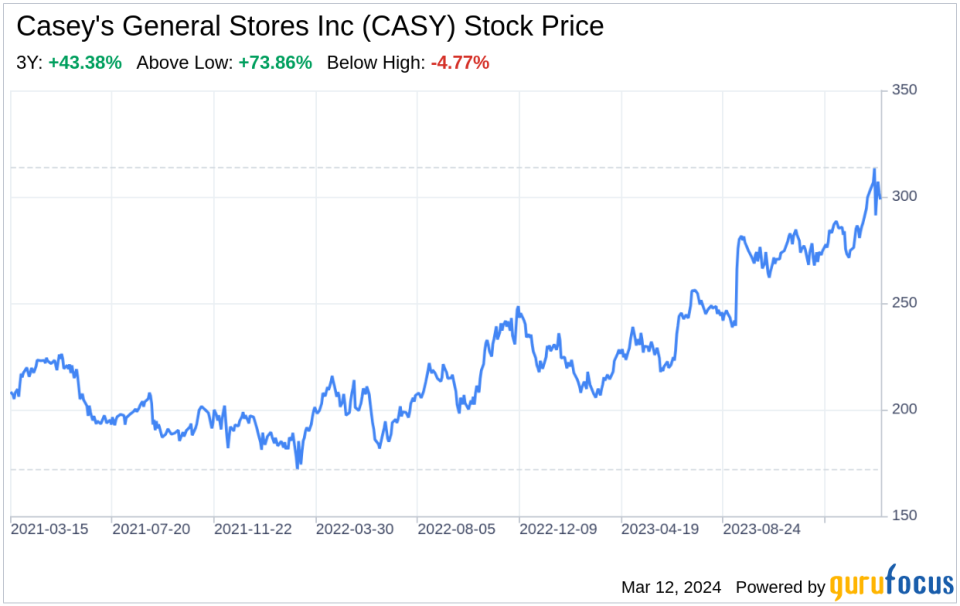Decoding Casey's General Stores Inc (CASY): A Strategic SWOT Insight
Casey's General Stores Inc (NASDAQ:CASY) demonstrates robust financial health with a diverse product offering and strategic store locations.
Despite market volatility, CASY maintains a strong balance sheet and continues to expand its footprint in the convenience store sector.
Opportunities for growth in renewable fuels and electric vehicle charging stations align with evolving consumer preferences.
Legal challenges and market risks pose potential threats, but CASY's proactive strategies aim to mitigate these concerns.
Casey's General Stores Inc (NASDAQ:CASY), a prominent convenience store chain with over 2,500 locations across the Midwest, recently filed its 10-Q report on March 11, 2024. This SWOT analysis delves into the company's financials, revealing a strategic positioning that leverages its strengths, addresses weaknesses, identifies opportunities for growth, and acknowledges potential threats. With a diverse range of products, including self-service gasoline, groceries, and freshly prepared foods, CASY continues to serve predominantly small-town America, with a significant presence in areas with populations under 5,000. The financial overview from the recent filing indicates a slight dip in diluted earnings per share from $2.67 to $2.33 year-over-year for the third quarter, reflecting the dynamic nature of the retail and fuel markets. However, the company's financial health remains robust, with a strong balance sheet and continued expansion efforts.

Strengths
Financial Stability and Store Network: Casey's General Stores Inc (NASDAQ:CASY) exhibits a strong financial foundation, with a network of 2,639 stores that cater to the convenience needs of customers in 17 states. The company's strategic presence in smaller communities, where competition is often less intense, provides a competitive edge. Its financial statements reflect a solid balance sheet, with sufficient liquidity to support ongoing operations and growth initiatives. The company's ability to maintain profitability, even amidst economic fluctuations, underscores its financial resilience and operational efficiency.
Brand Recognition and Loyalty: CASY has cultivated a strong brand identity, synonymous with convenience and quality. The company's focus on offering a broad selection of merchandise, including freshly prepared foods, has fostered customer loyalty. This loyalty is reflected in the company's same-store sales figures, which show a 7.5% increase in prepared food and dispensed beverage sales during the quarter. The brand's reputation for quality and convenience positions it favorably in the minds of consumers, contributing to repeat business and a stable revenue stream.
Diversified Product Mix: The company's product mix, which spans fuel, grocery, general merchandise, and prepared food, allows it to tap into multiple revenue streams. This diversification helps cushion the company against market volatility, particularly in the fuel sector. By offering a wide range of products and services, including car washes and EV charging stations, CASY can meet the varied needs of its customers, enhancing the overall shopping experience and driving sales across different categories.
Weaknesses
Market Volatility Impact: While CASY has demonstrated financial stability, it is not immune to the effects of market volatility, particularly in the fuel sector. The company's financial performance is partially dependent on fuel sales, which can be influenced by external factors such as crude oil price fluctuations and geopolitical events. Although CASY has managed to maintain a favorable revenue less cost of goods sold per gallon, the unpredictability of the fuel market remains a potential weakness that could impact profitability.
Legal and Compliance Risks: CASY faces legal challenges, such as the ongoing lawsuit alleging misclassification of Store Managers under the Fair Labor Standards Act (FLSA). While the company has made provisions for probable losses and continues to defend its position vigorously, such legal disputes can result in financial liabilities and damage the company's reputation. Additionally, compliance with extensive governmental regulations and tax laws presents a continuous challenge that requires diligent oversight and can lead to increased operational costs.
Reliance on Physical Store Traffic: The company's business model is heavily reliant on in-store traffic, which has not fully returned to pre-pandemic levels. The shift towards remote work and the resulting decrease in commuter traffic pose challenges to CASY's traditional store format. Adapting to these changing consumer behaviors is crucial for maintaining sales volumes, particularly in the fuel and convenience segments.
Opportunities
Expansion of Renewable Fuels and EV Charging: CASY is well-positioned to capitalize on the growing demand for renewable fuels and electric vehicle (EV) charging stations. With the installation of 170 charging stations across 12 states, the company is aligning with consumer trends and environmental stewardship efforts. This proactive approach to expanding alternative fuel options, including higher blended ethanol and biodiesel, presents significant growth opportunities as consumer preferences continue to evolve towards more sustainable transportation solutions.
Technological Advancements and Innovation: The company has the opportunity to leverage technology to enhance the customer experience and streamline operations. Innovations such as mobile apps, loyalty programs, and digital marketing can attract new customers and retain existing ones. By adopting advanced data analytics, CASY can gain insights into consumer behavior, optimize inventory management, and personalize marketing efforts, driving sales and improving operational efficiency.
Strategic Acquisitions and Brand Integration: CASY's ongoing efforts to transition "Bucky's" and "Minit Mart" locations to its "Casey's" or "GoodStop" brands offer opportunities for market consolidation and brand unification. Strategic acquisitions can expand the company's geographic reach and customer base, while the integration of acquired brands reinforces Casey's market presence and drives economies of scale.
Threats
Competitive Market Landscape: The convenience store industry is highly competitive, with numerous players vying for market share.
This article, generated by GuruFocus, is designed to provide general insights and is not tailored financial advice. Our commentary is rooted in historical data and analyst projections, utilizing an impartial methodology, and is not intended to serve as specific investment guidance. It does not formulate a recommendation to purchase or divest any stock and does not consider individual investment objectives or financial circumstances. Our objective is to deliver long-term, fundamental data-driven analysis. Be aware that our analysis might not incorporate the most recent, price-sensitive company announcements or qualitative information. GuruFocus holds no position in the stocks mentioned herein.
This article first appeared on GuruFocus.
